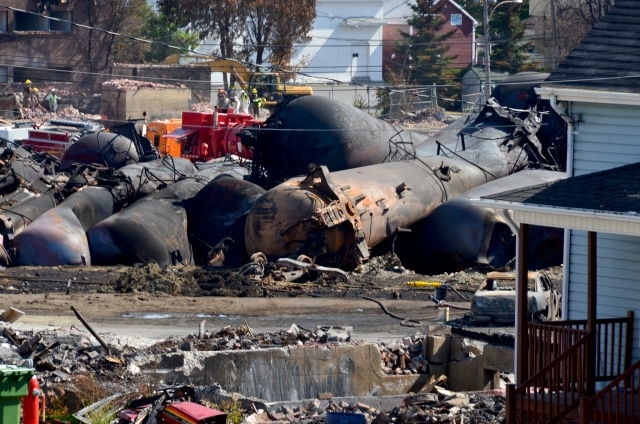People of color and low-income communities are bearing a disproportionate burden of risk from dangerous oil trains rolling through California, according to a new report by ForestEthics and Communities for a Better Environment.
Called “Crude Injustice On The Rails,” the report found that 80 percent of the 5.5 million Californians with homes in the oil train blast zone — the one-mile region around train tracks that would need to be evacuated in the event of an oil train derailment, explosion and fire — live in communities with predominantly minority, low-income or non-English speaking households.
Nine of California’s 10 largest cities that have oil train routes running through them have an even higher rate of “discriminatory impact,” the authors of the report found. In those cities, 82–100 percent of people living in the blast zone are in what they call “environmental justice communities.”
“In California you are 33 percent more likely to live in the blast zone if you live in a nonwhite, low income, or non-English speaking household,” Matt Krogh, ForestEthics extreme oil campaign director and one of the authors of the report, said in a statement.
New oil-by-rail rules inadequate
The Obama Administration released new oil-by-rail regulations in May that were heavily criticized as inadequate because the industry had too much influence over the final rules, which would not stop more incidents like the oil train derailment in North Dakota in May that led to an explosion and fire that burned for days. That was the fifth accident of its kind in the US so far this year.
Massive fireballs and raging infernos often accompany oil train accidents because of the highly volatile Bakken crude they frequently carry. Yet, as Justin Mikulka wrote here on DeSmog, the US Department of Transportation’s new regulations are so weak as to be little more than “a guidebook for the oil and rail industries to continue doing business as usual when it comes to moving explosive Bakken crude oil by rail.”
Partly in response to the Obama Administration’s weak regulations, ForestEthics and CBE are organizing a “Stop Oil Trains Week Of Action” starting July 6, the second anniversary of the Lac-Mégantic, Quebec oil train disaster that killed 47 people. Organizers say that over 100 events are being planned by volunteers across the country who are calling for stricter rules on oil trains to protect their communities.
ForestEthics’ Eddie Scher told DeSmog that he doesn’t think there’s any way to safely move crude oil by train, and enumerated two primary reasons.
“One is that the rail system in America was built to connect population centers,” Scher said. ForestEthics has mapped all of the oil train routes and built a website where you can look up whether or not you live in a blast zone.
“If you look at the blast zone map, which is based on the routes for oil trains as identified by the rail industry, you’ll see that every major US city, with very few exceptions, has oil trains running right through it,” Scher said. “Our rail lines were meant to move people and products, they were never meant to move hazardous materials.”
The second factor that Scher says makes crude oil too dangerous to transport by rail is that fire departments are not prepared to battle the blazes that ensue. “Rail companies and oil companies don’t keep emergency response equipment on hand,” he said, noting that oil train tanker cars hold 30,000 gallons each, and one train can be 100 or more cars long.
“The best-equipped fire departments in America are prepared to deal with a tanker truck,” Scher said. “That’s 10,000 gallons, one-third the size of one of these tank cars.”
“Oil trains contribute to environmental racism”
The “Crude Injustice” report makes a number of policy recommendations for dealing with oil trains, chiefly a moratorium to be declared by Governor Jerry Brown in California as a preliminary step to banning them outright. Scher also said the Obama Administration could use the Civil Rights Act of 1964 and Executive Order 12898, issued by Bill Clinton in 1994, to address the disparities of oil train impacts based on race and income nationwide.
California also has state laws that require the government to consider environmental justice in policy decisions, but so far that hasn’t happened.
Living in oil train blast zones is just one of the many environmental injustices minority and low-income communities in California are more likely to suffer. For instance, FracTracker Alliance reported last year that 79.6 percent of students attending a school within one mile of an oil or gas well are non-white (60.3% are Hispanic).
Nile Malloy, Northern California Program Director for Communities for a Better Environment, said in a statement, “It’s simple, oil trains contribute to environmental racism in California.”
Image Credit: Lac-Mégantic, Quebec, July 14, 2013 by meunierd / Shutterstock.com
Subscribe to our newsletter
Stay up to date with DeSmog news and alerts






